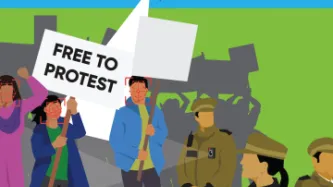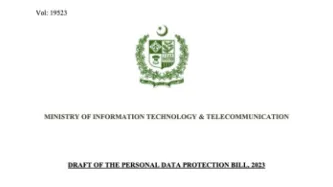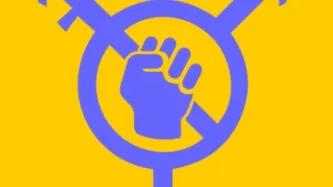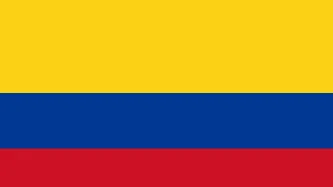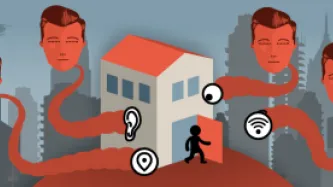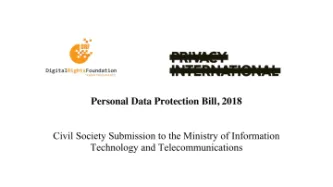Search
Content type: Report
The methodology employed for this report consists primarily of in-depth interviews held with grassroots political workers and representatives of collectives. The researchers interviewed 14 individuals from various social justice causes such as womens’ rights, climate change, transgender rights, students’ rights and the right to universal internet access in Pakistan. The experiences they have shared with the interviewers along with the real-time developments in the country’s law and order…
Content type: Explainer
The Free to Protest Guide Pakistan has been created by adapting Privacy International's (PI) Free to Protest Guide UK according to the laws and policies of Pakistan, in collaboration with PI and local activists in Pakistan.The Guide has been published in English, Urdu, Punjabi and Pashto.DISCLAIMER: This guide forms part of PI's global work to highlight the range of surveillance tools that law enforcement can use in the protest context, and how data protection laws can help guarantee…
Content type: Advocacy
Dejusticia, Fundación Karisma, and Privacy International submitted a joint stakeholder report on Colombia to the 44th session of the Universal Periodic Review at the UN Human Rights Council.Our submission raised concerns regarding the protection of the rights to freedom of expression and opinion, to privacy, and to personal data protection; the shutdown of civil society spaces; protection of the right to protest; and protection of the rights of the Venezuelan migrant and refugee population.…
Content type: News & Analysis
Privacy International (PI) is concerned by developments in Pakistan regarding the enactment of the Draft Personal Data Protection Bill, 2023 and the opaque process which will see the bill become law.
The Bill was published on 19 May 2023 by the Ministry of Information Technology and Telecommunication ('MITT'). However no open and inclusive consultation was open for comments to be submitted to the MITT. In a concerning development it was reported that the Bill was approved by the Federal…
Content type: Long Read
This piece was written by Joan López, researcher at Fundación Karisma, and originally posted on their website.
The uncertainty of this crisis has become an opportunity for the implementation of technological solutions to complex issues instead of coherent decision-making processes. During the social and economic crisis caused by Covid-19, the National Development Office (DNP in Spanish) in Colombia, in just two weeks, set up an unconditional cash transfer system for 3 million citizens. The…
Content type: Examples
Dejusticia, Colombia-based research and advocacy organisation, delivered a series of recommendations to the Ministry of Health and Social Protection to be taken into account when issuing the next decree on vaccination against Covid-19.
Their recommendations include:
Adding the principle of non-discrimination to the plan to be proposed;
Requesting that the population deprived of liberty be vaccinated sooner than proposed to ensure they are detained in decent conditions;
Ensuring the…
Content type: Examples
Corruption scandals have added to Latin America’s challenges in dealing with the coronavirus. In Ecuador, prosecutors identified a criminal ring that colluded with health officials to sell body bags to hospitals at 13 times the normal price, and many others are accused of price-gouging for other medical supplies.
The former Bolivian health minister is under house arrest awaiting trial on corruption charges, government officials in seven Brazilian states are under investigation for misusing…
Content type: Examples
An audit of two apps and a website used by national and local governments in Colombia finds: an absence of public information about the tools, how they work, or how their security and privacy is protected; non-compliance with Colombia’s data protection legal framework, particularly in the area of consent; and reckless deployment of solutions that put hundreds of thousands of users’ personal data at risk. Fundación Karisma, which conducted the audit, makes a number of recommendations for…
Content type: Examples
Human Rights Watch reports that drug cartels and rebel groups are imposing their own lockdowns in rural areas of Colombia and using WhatsApp chats and pamphlets to advise local residents of curfew hours, transport shutdowns, and other bans that are far more strict than those imposed by the government. They have murdered at least eight civilians. In some areas, violent gangs are preventing people from leaving their homes at all, in two provinces armed groups have punished violators by torching…
Content type: Examples
Colombia will adopt the Apple-Google contact tracing platform after finding it necessary to remove the contact tracing functions from CoronApp, the official Colombian coronavirus information app because they didn’t work. CoronApp was downloaded by 4.3 million people, and includes features to report symptoms and locate cases on a map. The contact tracing features, which were supposed to be able to overcome the limitations of the iPhone’s Bluetooth implementation, were provided by the Portuguese…
Content type: Examples
TrustNet Pakistan, the country’s only digital trust foundation, has begun work alongside many other global technology companies on a digital vaccination verification platform called CovidCreds. The initiative supports projects that use privacy-preserving verifiable credentials. TrustNet is working on a solution called Vaccify to provide verification that it’s safe for people to travel out of Pakistan. The system is expected to work via a mobile phone app that can digitally receive test results…
Content type: Examples
A detailed analysis of Pakistan’s app, which was developed by the Ministry of IT and Telecom and the National Information Technology Board and which offers dashboards for each province and state, self-assessment tools, and popup hygiene reminders, finds a number of security issues. Among them: the app uses hard-coded credentials, which it sends insecurely, to communicate with the government server, and it downloads the exact coordinates of infected people in order to provide a map of their…
Content type: Examples
The lack of data protection laws and the absence of a privacy commission are contributing factors to Pakistan’s failure to investigate or remedy security flaws in the country’s recently-launched COVID-19 tracking technology, which partially depends on a system originally developed to combat terrorism. While there are no reported cases of harassment or targeting based on the leak online of the personal details of thousands of COVID-19 volunteers, the lack of response fails to boost citizens’…
Content type: Examples
As the first confirmed coronavirus case in Pakistan, Yahyah Jaffery became a pariah after his identity, photograph, and home address were leaked on social media. Similar leaks about dozens of other patients and medical staff followed. The contact tracing system being used for coronavirus was originally developed by the country's Inter-Service Intelligence (ISI) to combat terrorism; it is based on a new data hub in Islamabad that will collect information from the ISI tracking system and share…
Content type: Examples
Our partners from Digital Rights Foundation in Pakistan wrote a piece analysing cases of privacy violations, misinformation, hate speech and other cases. As they said, the situation with regards to the Coronavirus is still developing in the country and Digital Rights Foundation, are keeping an eye out for the developments regarding the disease and also assessing how the digital rights sphere is being affected.
Link: https://digitalrightsfoundation.pk/protecting-your-digital-rights-during-the-…
Content type: Examples
Our partners from Karisma in Colombia analysed three different technological solutions intending to deal with the COVID-19 pandemic, finding vulnerabilities in them (in Spanish).
Link: https://web.karisma.org.co/que-sabemos-de-las-tres-herramientas-que-se-anuncian-como-soluciones-tecnologicas-para-el-manejo-del-covid-19/
Content type: Examples
Civil Society advocates, including PI, expressed their dissaproval of a letter from the Colombian Data Protection Authority, which was intending to give a blank exception to the government in relation with handling the pandemic.
Link (in Spanish): https://web.karisma.org.co/organizaciones-de-la-sociedad-civil-rechazan-circular-de-la-sic-sobre-uso-de-datos-personales-para-controlar-la-pandemia/
Content type: Examples
The Pakistani government has repurposed a system designed by the country's spy agency, inter-Services Intelligence for tracking down terrorists to trace suspected COVID-19 cases. Prime minister Imran Khan has said that efficient tracking and testing of coronavirus-infected people is the only way to reopen the country's closed businesses.
Source: https://www.indiatoday.in/world/story/pakistan-government-isi-system-track-suspected-covid-19-cases-pm-imran-khan-1670378-2020-04-24
Writer: Press…
Content type: Examples
An Excel file containing complete data pertaining to patients tested for coronavirus in the cities Quetta and Taftan in the the Balochistan region of Pakistan has been circulating in WhatsApp groups about Balochistan. The file contains information such as names, phone numbers, age address and other identifying information for the patients. The leaked data puts the patients at risk of personal harm and social stigma, even after recovery. Balochistan government officials say the data leaked…
Content type: Examples
An official directive from the Pakistani provincial government of Sindh titled "COVID-19 Mobile Registration System for Needy People" describes its use of multiple databases to identify those in need of welfare funds and disburse cash to them by combining taxpayers' data from the Federal Board of Revenue, travel histories from the Federal Investigation Agency, and financial information from the State Bank of Pakistan. Recipients need to create cellphone accounts via the service provider Jazz in…
Content type: Examples
Mobile phone users in Pakistan have discovered that the government is accessing, without consent, their mobile phone location and call records despite legal questions about whether doing so violates the country's constitution. After users reported that patients testing positive for COVID-19 returned home, the government sent SMS "Karuna Alert" messages to some of their friends, family, and neighbours; the Pakistan Telecom Authority confirmed it had sent the messages using patients' registered…
Content type: Examples
After Pakistani residents queried whether messages labelled "CoronaALERT" sent out via SMS were legitimate, telecom authorities confirmed that it was authentic, being sent to selected individuals at the request of the Ministry of Health under the Digital Parkistan programme. Individuals were chosen because they might have come in contact with infected individuals during travel or in specific locations. It is not clear, however, what the criteria were for selecting individuals at risk,…
Content type: Examples
Colombia's has launched the free, Android-only, prevention-focused Colombia-Coronapp developed by the National Health Institute (INS) to help identify and eradicate the virus across the country, as well provide centralisation and transparency. Besides their basic information, users are asked to say if they have participated in any mass events in the prior eight days, a controversial question because of the recent protests across the country. The app also provides safety tips, an updated map of…
Content type: Case Study
Photo by Roger H. Goun
Chloe is an investigative journalist working for an international broadcast service; we will call the TV show she works for The Inquirer. She travels around the world to work with local journalists on uncovering stories that make the headlines: from human trafficking to drug cartels and government corruption. While her documentaries are watched by many and inspire change in the countries she works in, you would not know who Chloe is if we were to tell you her real name.…
Content type: Long Read
For International Women’s Day 2019, Privacy International looks at some of the key themes around the intersection of gender rights and the right to privacy and we review the work we and our partners have done on those topics.
When dealing with cases of non-consensual sharing of intimate images, often known as ‘revenge porn,’ or doxxing, where a person’s personal details are shared publicly, the link between privacy and online-gender-based violence is very clear. Privacy…
Content type: Long Read
The Privacy International Network is celebrating Data Privacy Week, where we’ll be talking about how trends in surveillance and data exploitation are increasingly affecting our right to privacy. Join the conversation on Twitter using #dataprivacyweek.
In the era of smart cities, the gap between the internet and the so-called physical world is closing. Gone are the days, when the internet was limited to your activities behind a desktop screen, when nobody knew you were a dog.
Today, the…
Content type: State of Privacy
Table of contents
Introduction
Right to Privacy
Communication Surveillance
Data Protection
Identification Schemes
Policies and Sectoral Initiatives
Introduction
Acknowledgement
The State of Privacy in Colombia is the result of an ongoing collaboration by Privacy International and Fundación Karisma and Dejusticia.
Key Privacy Facts
1. Constitutional privacy protection: The constitution contains an explicit protection of the right to privacy (Article 15 of the 1991 constitution).
2…
Content type: State of Privacy
Table of contents
Introduction
Right to Privacy
Data Protection
Identification Schemes
Policies and Sectoral Initiatives
Introduction
Acknowledgment
The State of Privacy in Pakistan is the result of an ongoing collaboration by Privacy International and the Digital Rights Foundation.
Between 2014-2016, Bytes for All contributed to previous versions of the 'Data Protection' sections of this briefing.
Key Privacy Facts
1. Constitutional privacy protections: Article 14(1) of…
Content type: Long Read
The idea of a “smart city” is primarily a marketing concept, used to sell data-intensive technologies under the pretext of improving the functioning of cities. This could include injecting ‘smart’ tech into delivering services, public safety, environmental monitoring, traffic control, among other possible applications.
One in particular aspect of smart cities has been consistently problematic: how these projects are used to boost law enforcement and policing under the guise of public safety.…
Content type: Advocacy
We welcome the effort by the Pakistani Ministry of Information Technology and Telecommunications to regulate the processing of personal data in Pakistan, and take measures to guarantee the right to privacy as guaranteed under Article 14(1) of the Constitution: “[t]he dignity of man and, subject to law, the privacy of home, shall be inviolable.”
This legislative development is crucial and timely as Pakistan continues to embrace innovative governance initiatives and deploy data-intensive systems…
